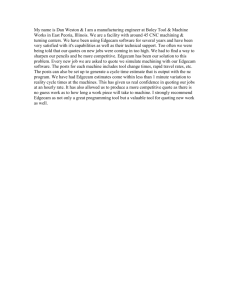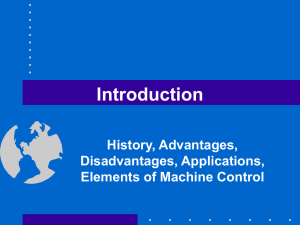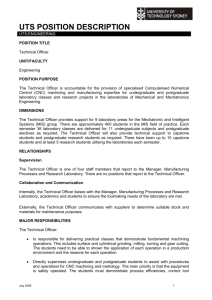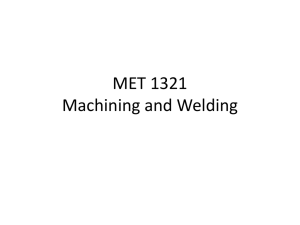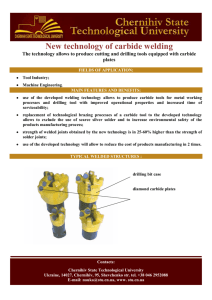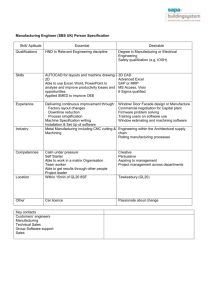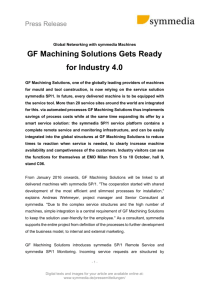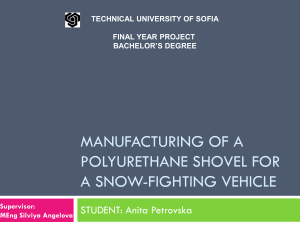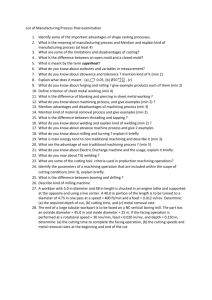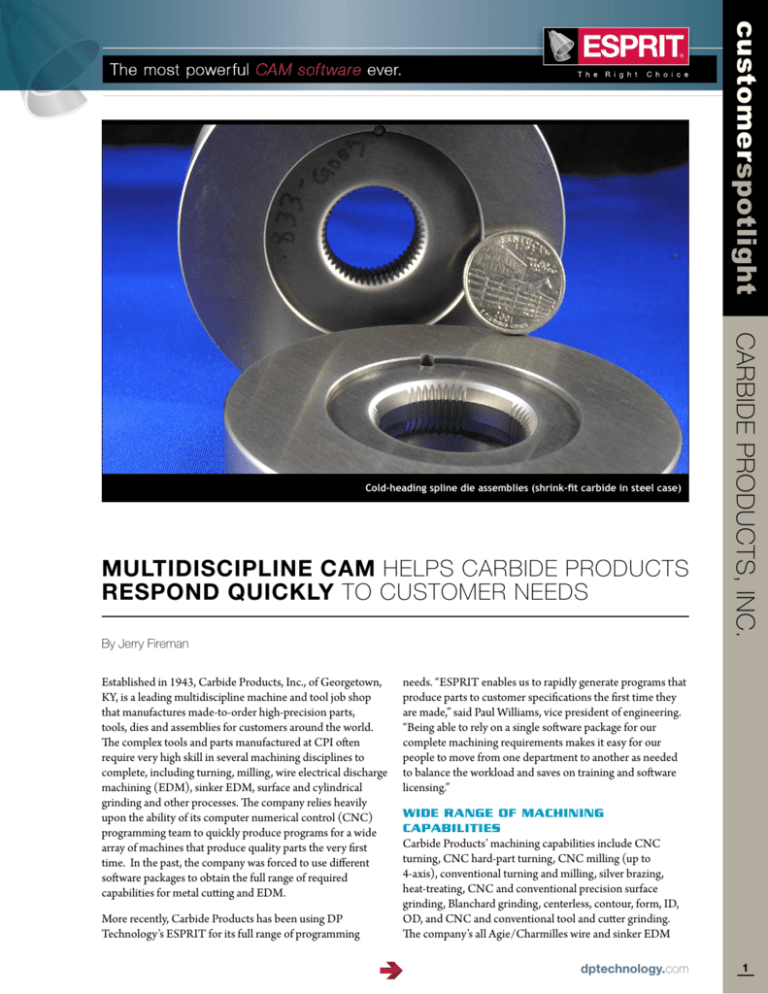
customerspotlight
Multidiscipline CAM Helps Carbide Products
Respond Quickly to Customer Needs
By Jerry Fireman
Established in 1943, Carbide Products, Inc., of Georgetown,
KY, is a leading multidiscipline machine and tool job shop
that manufactures made-to-order high-precision parts,
tools, dies and assemblies for customers around the world.
The complex tools and parts manufactured at CPI often
require very high skill in several machining disciplines to
complete, including turning, milling, wire electrical discharge
machining (EDM), sinker EDM, surface and cylindrical
grinding and other processes. The company relies heavily
upon the ability of its computer numerical control (CNC)
programming team to quickly produce programs for a wide
array of machines that produce quality parts the very first
time. In the past, the company was forced to use different
software packages to obtain the full range of required
capabilities for metal cutting and EDM.
More recently, Carbide Products has been using DP
Technology’s ESPRIT for its full range of programming
Carbide Products, Inc.
Cold-heading spline die assemblies (shrink-fit carbide in steel case)
needs. “ESPRIT enables us to rapidly generate programs that
produce parts to customer specifications the first time they
are made,” said Paul Williams, vice president of engineering.
“Being able to rely on a single software package for our
complete machining requirements makes it easy for our
people to move from one department to another as needed
to balance the workload and saves on training and software
licensing.”
Wide range of machining
capabilities
Carbide Products’ machining capabilities include CNC
turning, CNC hard-part turning, CNC milling (up to
4-axis), conventional turning and milling, silver brazing,
heat-treating, CNC and conventional precision surface
grinding, Blanchard grinding, centerless, contour, form, ID,
OD, and CNC and conventional tool and cutter grinding.
The company’s all Agie/Charmilles wire and sinker EDM
dptechnology.com
1
customerspotlight
department is capable of holding tolerances
to +/-0.00012” (3µm) and surface finishes
below 4 rms with no recast layer.
The vast majority of the company’s
production consists of special tooling that is
used to make other products; from machine
tools and power train components to peanut butter, pencils
and light bulbs. Production runs tend to be very short, often
just a single piece. The result is that the company does much
more CNC programming than most other companies of
the same size — and tolerances tend to be extremely tight,
often +/-0.0001 inch. The materials used by the company
tend to be costly, so it’s essential to get the program right
the first time. In the past, the company used several different
CNC programming systems in different areas such as EDM,
turning or milling. Programmers’ level of satisfaction varied
with the different programs. The use of multiple CNC
programs made it difficult to move programmers to help
out in an area that was particularly busy and increased the
complexity of training and administration.
CNC programming challenges
“When I first joined the company, we were much smaller
and I was able to handle all the programming by myself,” said
Ron Wainscott, EDM department supervisor for Carbide
Products. “As we grew, the programming task became more
than I could handle and today the EDM, lathe and mill
departments each have their own programmers. Our ability
to respond quickly to customer requests is critical to our
success.”
Carbide Products, Inc., of Georgetown, Kentucky
“We might have a customer call in today whose production is
down and needs a tool or machine part to get it restarted. We
will immediately begin programming the part and then go
right into production, and potentially have the part ready for
the customer in a couple of hours.”
“ESPRIT first came to our attention when we had problems
with our previous EDM software in programming a
new Mitsubishi machine,” Wainscott said. “Mitsubishi
recommended ESPRIT because many of their other
customers were using it successfully. We also heard good
things about ESPRIT from other machine shops that were
attending the International Machine Tool Show (IMTS). We
found that ESPRIT is capable of generating accurate posts
for the new machine and that it lends itself to fast turnaround
work. ESPRIT also provides a number of other valuable
features that were lacking on our previous programming
software. So we switched not just our EDM work but all of
our CNC programming to ESPRIT and have used it ever
since.”
Carbide Products, Inc.
The company machines a wide variety
of materials and material combinations,
including solid tungsten carbide, carbide
tipped, silicon carbide, silicon nitride, highspeed and tool steel, stainless steel, super
alloys, silver tungsten, copper tungsten,
samarium-cobalt rare-earth, cast iron,
other ferrous and non-ferrous alloys, heavy
metals, polycrystalline diamond (PCD),
polycrystalline cubic boron nitride (PCBN)
and plastics. All machining processes, as well
as heat-treating, brazing, assembly, inspection
and documentation are performed in-house
for total quality control.
ESPRIT’s full-spectrum functionality includes programming
for 2-5 axis milling, 2-22 axis turning, 2-5 axis wire EDM,
multitasking mill-turn machining, and B-axis machine tools.
“Being able to rely on a single software package for our complete
machining requirements makes it easy for our people to move from one
department to another as needed to balance the workload and saves on
training and software licensing.” -- Paul Williams, Carbide Products, Inc.
dptechnology.com
2
customerspotlight
A programmer at the helm of an Agie Progress Wire EDM machine
ESPRIT’s XY (lower), UV (upper) 4-axis contouring cycle
quickly programs parts with extremely complex tapers
or completely independent freeform shapes. The 4-axis
cutting process is automatically synchronized for any two
three-dimensional profiles and the programmer can add
an unlimited number of additional synchronization lines.
ESPRIT adds tabs automatically and creates skim cuts
for unattended machining. ESPRIT supports every make
and model of Agie EDM machine and fully exploits Agie
machine capabilities, including dual tapering, upper and
lower tapers, and advanced conics.
Electric motor stator die insert (solid carbide)
Programming for milling and
turning
Programming parts for milling and turning can be done
with the same user interface and following the same basic
workflow, which makes life easier for the programming
team. Lee Ross, milling department supervisor, said that
the programming of a part in his department also typically
begins with defining the geometry with ESPRIT based on
a paper drawing provided by the customer. He typically
adds grind stock and then defines the features in the part.
Carbide Products uses a combination of application-specific
machining in which the machining operation is defined for
the individual application and knowledge-based machining,
which involves reusing operations that have been optimized
for specific materials, geometries and tools.
The milling department has developed a library of machining
operations that include the tool and associated machining
parameters and can be simply dragged and dropped onto a
feature to create a toolpath. The ESPRIT KnowledgeBase™
provides detailed tool control and extensive process
automation, automatically choosing the most suitable
process to machine a given feature — including machining
cycles, cutting tools, speeds and feeds, and all associated
machining parameters. When a process is applied, process
steps are automatically adjusted to accommodate the feature
geometry and other feature characteristics. This saves time
by automating many tedious programming functions. The
KnowledgeBase™ also can help reduce machining cycle times
by providing programmers with standardized operations that
have been optimized by highly skilled and experienced
programmers.
Carbide Products, Inc.
EDM programming
Carbide Products typically receives
geometry from its customers in the form
of a DXF file or a paper drawing. A typical
EDM part made by Carbide Products
requires making five different internal angles
in a block of solid carbide and has tight
dimensional tolerances and tough surfacefinish requirements. The programmer opens
up ESPRIT and either imports the DXF file
or defines the geometry of the part using
ESPRIT’s computer aided design (CAD)
functionality. The programmer then defines
features in the part that normally correspond
to machining operations, such as pockets,
island, bosses and grooves. He or she creates
the draft features for the UV axis and applies
the toolpath to those features. This part is
then produced on one of the four Agie fouraxis wire EDM machines.
Regardless of the type of machine being programmed, the
next step is simulating the entire manufacturing process in
order to verify that the part produced by the program meets
the customer’s requirements. The programmer can view each
individual cut in the entire machining process in dynamic 3D
solids. ESPRIT also makes it easy to inspect the finished part
dptechnology.com
3
customerspotlight
by comparing the as-machined workpiece
to the original part design. Programmers
can zoom in on the simulated part to
determine whether or not it matches the
customer’s design. The simulation performs
a comparison of the toolpath with the solid
model and displays any part violations as
well as the amount of material remaining
using a customizable color format. The
simulation takes only a few seconds to
run but provides a highly effective way to
identify and fix programming problems
before they reach the shop floor.
Speed reducer drive component (steel)
DP Technology Corp.
1150 Avenida Acaso
Camarillo, CA 93012 USA
A programmer sets up a Haas 4-axis CNC mill
us nearly eliminate programming errors, which reduces
machine setup time and improves shop efficiency.” g
ON THE WEB:
www.carbidepros.com
Carbide Products, Inc.
“We use ESPRIT in nearly every aspect
of every process in our manufacturing
operations,” Williams concluded. “Its
advanced capabilities have helped us reduce
programming time and increase machining
productivity. We can now program the
most complicated parts in considerably less time than was
required in the past. ESPRIT’s knowledge base of machining
capabilities enable us to optimize machining operations
for cycle time improvements, store them in a library and
quickly apply them to features. The ability to create a realistic
simulation of the complete machining operation has helped
Laser LED reflector assembly (aluminum, delrin, stainless steel)
Phone: 1 800 627-8479
Outside the US: + 1 805 388-6000
Email: esprit@dptechnology.com
ESPRIT is a registered trademark of DP Technology Corp.
©2011 DP Technology Corp. All rights reserved.
dptechnology.com
4

